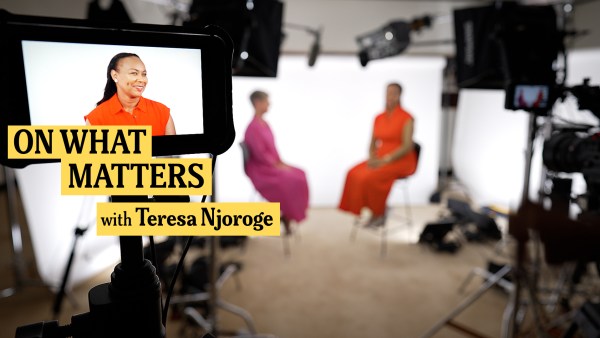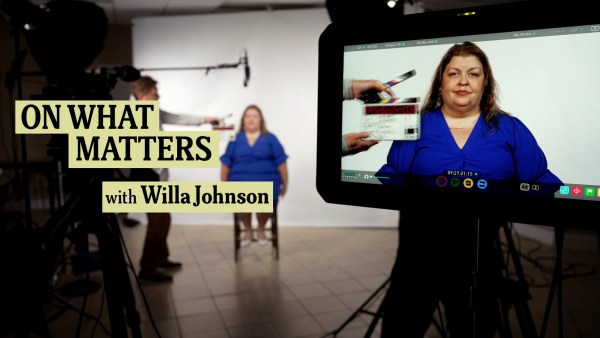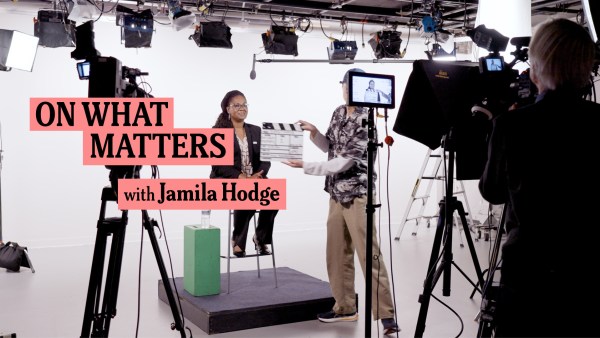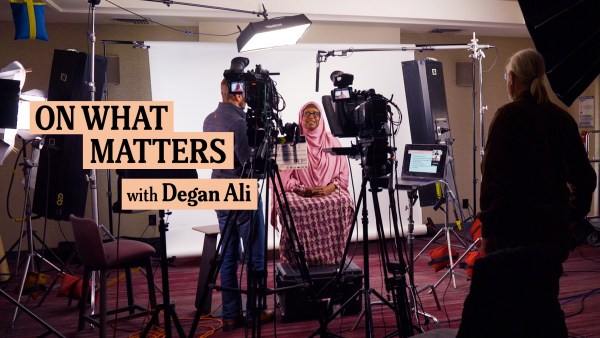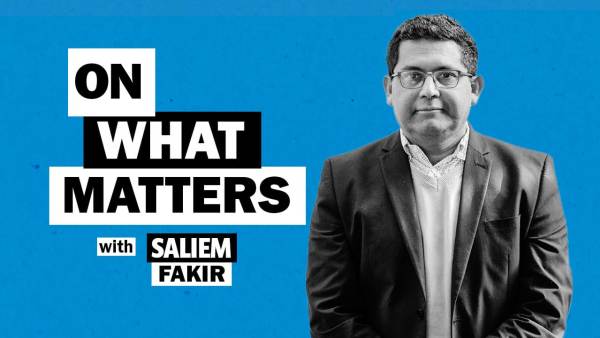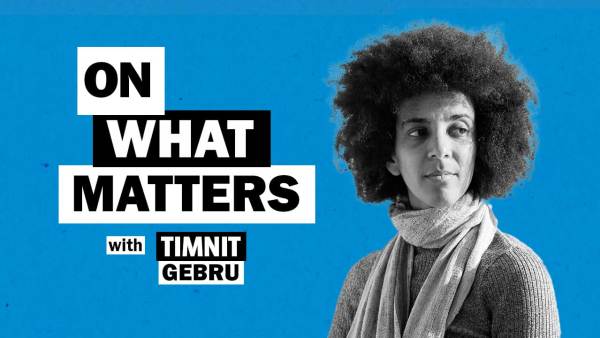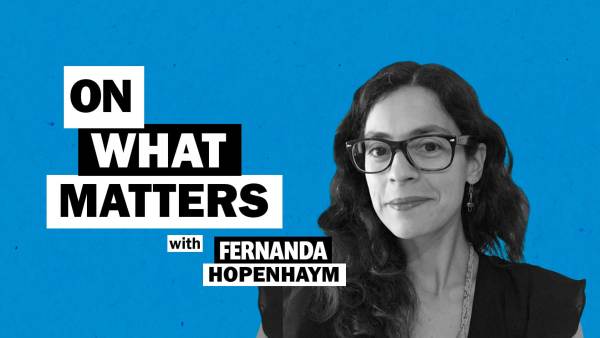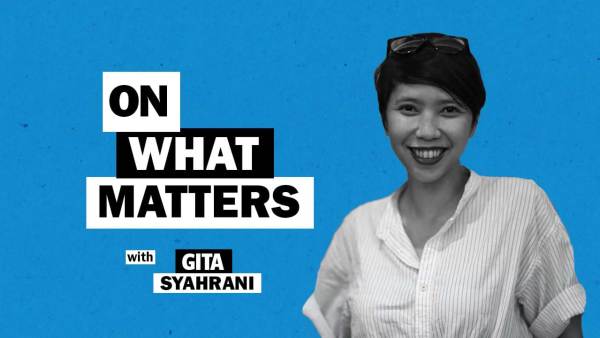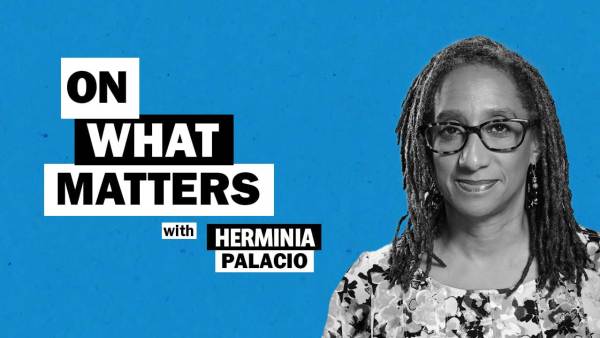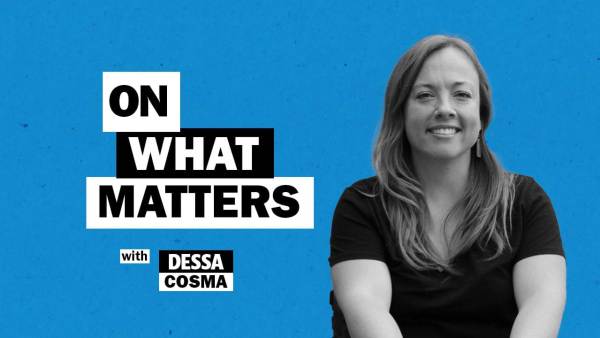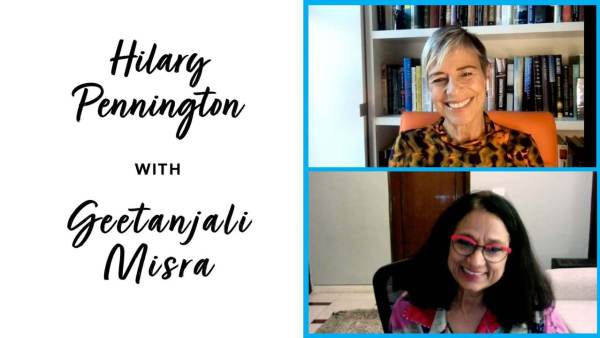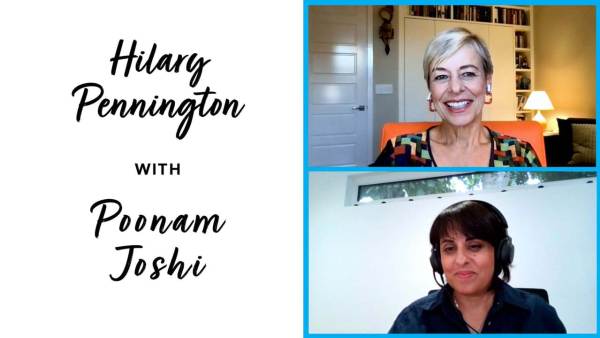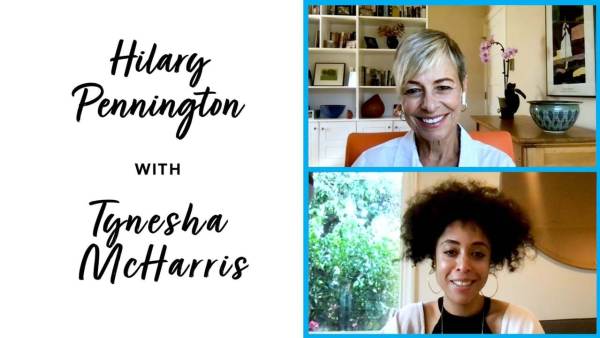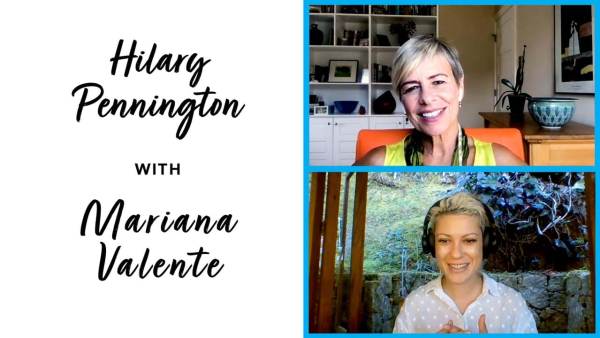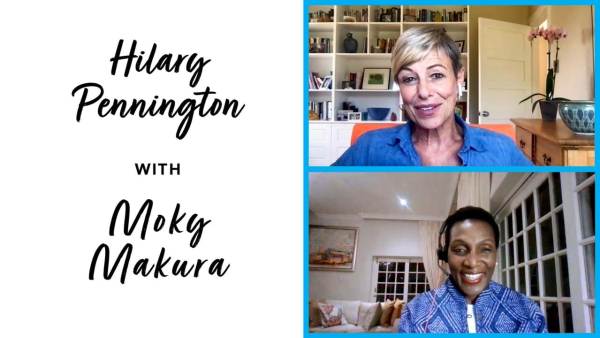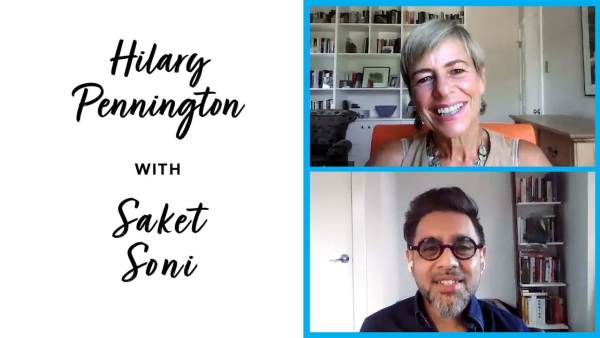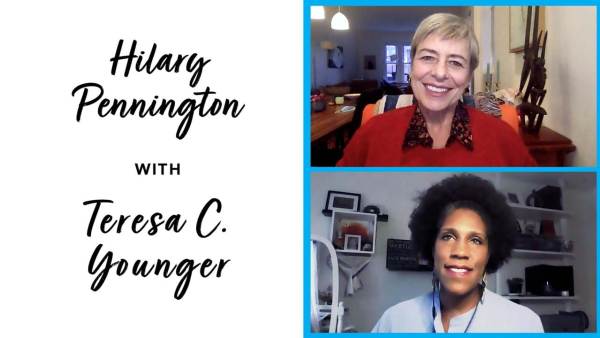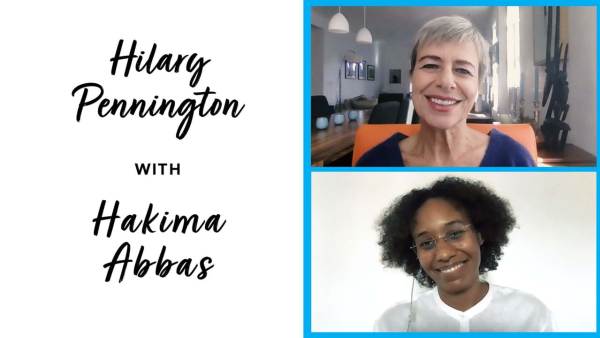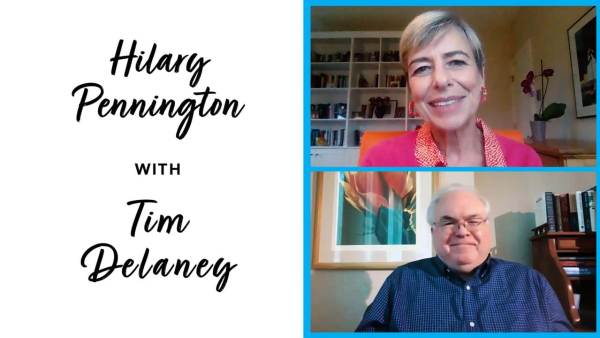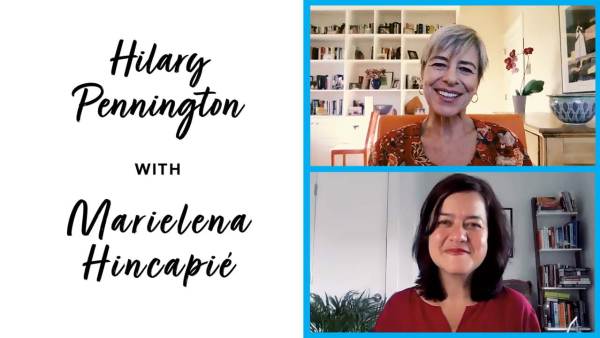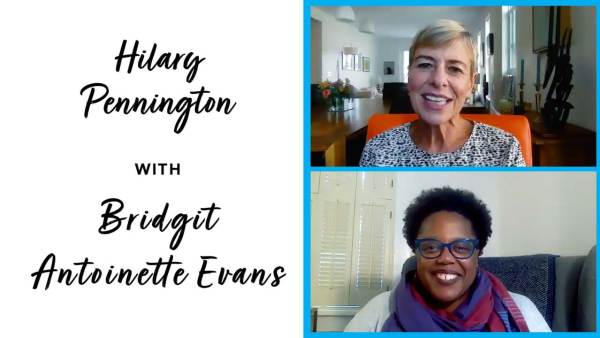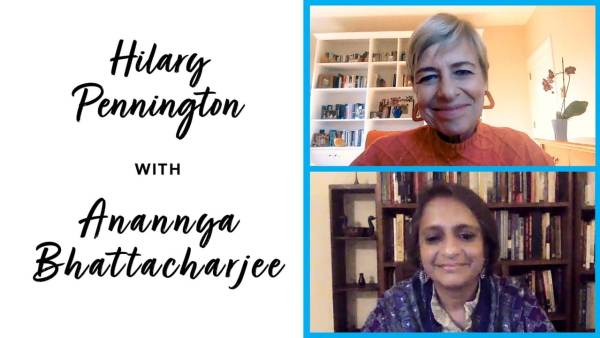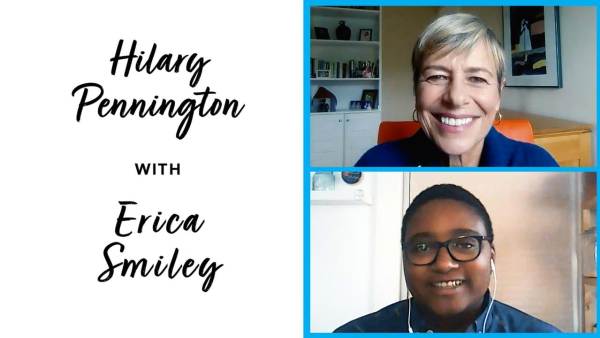Centering Disability Rights and Justice With Marlene Sallo and Hilary Pennington

Transcript
HILARY PENNINGTON: Hi, I’m Hilary Pennington. Thanks for joining us for “On What Matters.” I’m the executive vice president for programs at the Ford Foundation. I’m a white, middle-aged woman with short hair and a blue sweater, and my pronouns are she/hers. And today I will be speaking with Marlene Sallo about amplifying where disability intersects with justice. Welcome, Marlene.
MARLENE SALLO: Thank you so much, Hilary. I’m Marlene Sallo, and I am the executive director of the National Disability Rights Network. I’m an Afro-Latina female with shoulder-length gray-brown hair, and I’m wearing a yellow blouse with flowers and I go by the pronouns she/her/ella.
HILARY PENNINGTON: Let’s dive right in to learn more. I want to ask you about the systems that support or fail the disability community. But first, can you start us out with how you describe the nature and the size of the disability community itself?
MARLENE SALLO: So according to the CDC, one in four Americans have a disability. But I would say that we’re even larger than that, because we always need to consider the fact that as we age, most of us will also develop a disability over time. So we are everywhere but, most importantly, we’re not monolithic. We intersect with every single identity and every single community throughout the U.S. and beyond.
HILARY PENNINGTON: So, holding that in mind, let’s talk about the various systems that we do have to serve people with disabilities. And, if we were to redesign those systems, what would today’s disability justice framework look like?
MARLENE SALLO: I believe that the disability justice framework goes hand-in-hand with what we call reflective democracy: making sure that all the work that we are doing is representative of the demographics of the communities that we’re serving—and so, taking into account the fact that we are everywhere. We cross a section with individuals who come from other countries, who are African-American or Latino. We are in the communities as homeless individuals. It is important, as we do this work, to ensure that every advocacy point that we’re bringing to the table, every policy that we are creating, is inclusive and is representative of every single individual within that community. Sometimes the systems get it right and sometimes they get it wrong, but it’s important for us in the disability community to be front-and-center, allowing our voices to be heard and making sure that we have a seat at the table.
HILARY PENNINGTON: When you’re describing systems that work with justice, it makes me think about the story we all hear about curb cuts and how really, when something is designed so that it works for people with disabilities, it actually works better for all of us. If we were going to address specific economic and social injustices that affect the disability community, can you talk a little bit more about how you would recommend we do this? How we get at those kinds of injustices?
MARLENE SALLO: Well, I think addressing social injustice and economic injustice across the board is also addressing the social and economic injustices that the disability community experiences on a daily basis. But most importantly, as we are trying to reframe the justice system and the systems at large, we need to take into account the individual needs of a person with a disability, and we need to take into account the needs of the whole person. So sometimes we may say, well, if we fix the ramp into this building, then that’s taken care of everything…but what about the public transportation that got you there to begin with? If that was inaccessible, then you can’t use that ramp in that facility, right? If we’re saying that we want everyone with a disability to be able to work in an integrated, competitive employment, then we need to make sure that we are providing accessible buildings and that we are ensuring that accommodations are being provided for individuals with disabilities based on their personal need. And so we can’t look at it in a very siloed perspective. We have to look at the full range of needs within the disability community and ensure that as individuals are going through the different life stages, we are meeting each and every one of their needs across the board, and not just specifically on one individual thought or process or policy or system.
HILARY PENNINGTON: Well, that’s so important. I have a sister with disabilities, and, I think, my experience with her life is that we have systems that are very, very patchy. There are systems that we’ve set up that serve young children, but the systems get worse and worse and less and less inclusive as someone goes through their lives. Could you talk a little bit about the importance of just…understanding disability justice from not one point in time, but across a lifespan?
MARLENE SALLO: We have laws that protect the rights of students with disabilities in the school system. And so from K through 12, if done correctly, the needs of each student with a disability is being addressed in a holistic fashion, and we’re providing them with supportive services and accommodations as needed. And then, all of a sudden, they reach the age of 18 and they fall off a cliff. And there’s this lack of transition into the workforce, a lack of transition into being independent within their communities at large. And so we need to stop that process and think about, holistically, how do we ensure that individuals with disabilities, under a disability justice framework, have the ability for self-determination, right? And they’re being provided the opportunity to be self-sufficient and to reside in the communities of their choice as productive individuals of their community? And so I think that we need to really take into account that from birth to death, there are many stages in life. There are many opportunities to ensure that individuals with disabilities are receiving the services that they need, and the supports that allow them to be independent and to exercise self-determination.
HILARY PENNINGTON: Well, I love that you talked about laws. You know, when my sister was coming of age, it was before we had the Individuals with Disabilities Act, and, I think, laws are important for democracy. So let’s talk a little bit about democracy and disability. There have been such iconic fights for justice in the disability community over decades, and we have so far left to go. What can we learn from and do with the disability community as we work together on the unfinished project of America to build a multiracial democracy?
MARLENE SALLO: We’re still trying to build that multiracial democracy, I will say, but I think what folks fail to realize is that the disability rights movement, as it started, was parallel to the civil rights movement, and disability rights is civil rights. And so as we continue to infuse the disability justice framework in our day-to-day advocacy activities, we need to ensure that it is bringing everyone to the table. The disability rights movement was led by middle-aged white men, right? We are more than that within the community. For instance, I am an Afro-Latina disabled immigrant, right? So those are multiple identities. And so we need to ensure that representation is always there along that continuum of the advocacy fight, along the continuum of access to services, as well as delivery of services. But most importantly, when we’re speaking about a multiracial democracy, we need to understand that individuals with disabilities intersect. It’s an intersectional aspect of our lives. Therefore, we should be represented within each and every community that is at the table.
HILARY PENNINGTON: Oh, thank you for that. That is so, so very important. And, I can’t resist, you know, you talked about the fact that historically, disability community organizations have been led largely by men, largely by white men, and you are the first woman leading the National Disability Rights Network. Can you just talk a little bit about what that’s been like for you and how women today are continuing to shape the work of the disability rights movement?
MARLENE SALLO: Absolutely. So I will say, just from personal experience, I’ve worked in many different organizations, and it’s led by men most of the time, and so for me, it was important to be here front-and-center as an immigrant, as a Latina, as a female, representing our disabled community. But I didn’t really understand the power of that until my first day on the job, where I received unsolicited emails and text messages from other Latinas saying, “Thank you. Thank you for showing up. Thank you for representing.” It’s about representation, because we all want to be seen. We all want to be heard, and we all want that sense of belonging. And as studies show, especially within a classroom, when a student has someone that represents them at the front of the room, there’s that additional connection. And that also applies within the workforce and it applies within the movement at large. I think what I bring to the table is what any woman would bring to the table, and it’s that additional level of understanding and empathy and the need to connect that is seen among us, time and time again. But also I bring lived experience, right? Lived experience within different identities that all intersect to make me who I am. And so I think that brings a different level of understanding to the work that I’m currently doing.
HILARY PENNINGTON: Thank you for being that kind of leader. It is so important for people to see themselves in leadership, and in people like you. So we’re going to go to the questions from the audience. And our first question is from Danielle, and she asks, “How do you work to ensure and improve accessibility for students with disabilities in education?”
MARLENE SALLO: Oh, that’s a very important question, and so time and time again, what we’re trying to do is raise awareness—among parents, among teachers, among school employees—about the rights of students with disabilities, not only from a legal perspective, but just a humanistic perspective. So our goal is to ensure that students, as well as their parents, have the information that they need to advocate not only for their child, but also to advocate for themselves. It’s about self-determination. And so we ensure that we provide information, that we provide training, and that we make sure that everything that is provided is language-accessible so that they can learn about their rights. They can advocate on behalf of themselves or others on the rights that they have within the school system. But at the same time, we’re also training and providing information to school districts, the teachers themselves, and the administrators to ensure that they know what they are required to do on behalf of students with disabilities, because a parent and a student may be the best self-advocates. But if the school districts are not being held to ensure that they are following the regulations and the laws by our agencies, and they’re not being trained, then we’re not getting the effect that we want, which is access to equitable education, because it’s a justice issue for students within the school districts.
HILARY PENNINGTON: So that they have agency and charge over their lives.
MARLENE SALLO: Yes, which connects with what we said within the disability justice framework is that everyone has the right to self-determination, autonomy, and advocating for themselves.
HILARY PENNINGTON: 100%. All right. We’re going to go to the second and the last question, from Virginia, and she has a really important statement before the question, which I’m going to read: “Data makes clear that youth with disabilities, especially Black and Brown disabled youth, are disproportionately subjected to harsher school discipline, school push-out practices, foster system involvement, criminal legal system entanglement, and institutionalization in congregate facilities. How does NDRN and its network advocate on behalf of disabled youth of color?”
MARLENE SALLO: This question is very important to me because, time and time again, having been a special education teacher before becoming a civil rights attorney, I experienced firsthand what it means to be a youth of color and to be dually involved in the juvenile and criminal justice system, or “injustice” system, right? What we try to do is raise awareness about the rights of youth with disabilities that are being pushed out of school for no reason but for the fact that they have a disability. We’re seeing time and time again, youth of color are being pushed out of schools just for a manifestation of their disability. So how do we ensure that parents and schools are doing what they’re supposed to do under IDEA, which is the legal protections that exist, and that are ensuring that students from the beginning are being provided the supportive services that they need, and that are required under the law, to ensure that they can remain engaged in school and that they can complete their school day, let alone their school year. And so we’re raising awareness through training and technical assistance, through advocacy at the state level as well as at the national level, ensuring that ongoing discussions are taking place with our federal agencies that oversee the laws that protect youth within the school. But most importantly, we’re empowering parents and we’re empowering youth to speak up and to know what protections they have, and then to hold the school systems’ feet to the fire.
HILARY PENNINGTON: To know their rights. All right, we are at the end of our time, and I want to close with the last question that we always ask on these ”On What Matters” series, which is: What gives you hope?
MARLENE SALLO: What gives me hope is the fact that the disability justice framework is being seen everywhere now. It’s not just within the disability community and the work that I’m doing.
I’m getting phone calls from individuals that work on drug policy protections, that work on reproductive justice, that are pushing back on the prison industrial complex, and they’re saying, “As we’re doing our advocacy, as we’re doing our outreach, we want to ensure that we are embracing and supporting the disability justice framework. Can we have these conversations? Can you join us in meetings?” And this gives me hope because, for far too long, our community has been shunned. We’ve been set aside. We’ve been institutionalized. And we are now seeing that we are at tables. We are being included in discussions. There’s still work to be done, but I’m hopeful that as we continue to advocate and to show everyone just how important it is to have us at the table, that they’ll continue to include us in further conversations.
HILARY PENNINGTON: Well, you and the power and momentum of this movement give me hope, too. Thank you, Marlene, for a really, really wonderful conversation, and thank you to everyone who joined us today. We hope you learned a lot, and please don’t miss our next episode. Thank you.
End of transcript.
Accessibility Statement
- All videos produced by the Ford Foundation since 2020 include captions and downloadable transcripts. For videos where visuals require additional understanding, we offer audio-described versions.
- We are continuing to make videos produced prior to 2020 accessible.
- Videos from third-party sources (those not produced by the Ford Foundation) may not have captions, accessible transcripts, or audio descriptions.
- To improve accessibility beyond our site, we’ve created a free video accessibility WordPress plug-in.
Welcome to “On What Matters,” a conversation series in which Ford Foundation leaders talk to our social justice grantees on the frontlines of change.
In this episode, Hilary Pennington, Ford’s executive vice president of programs, interviews Marlene Sallo, executive director of the National Disability Rights Network, a national organization that advocates for protecting the civil and human rights of all people with disabilities.
Marlene outlines the vast size of today’s disability community and the intersectional approach needed to achieve disability justice.
Learn more about NDRN at: https://www.ndrn.org/
